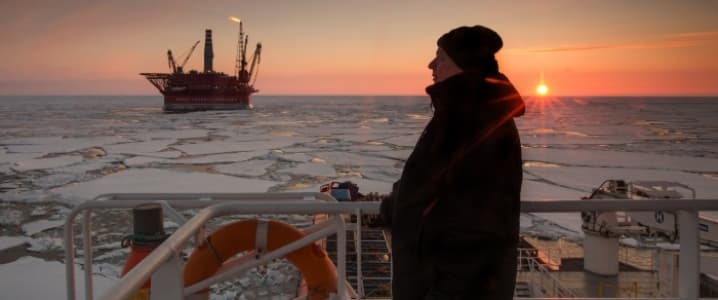The Arctic – a cold wasteland that has shattered the expansion dreams of many an oil company by proving to be too difficult and too expensive to tackle. And, of course, Arctic exploration is the target of major environmentalist opposition to any intervention in this wasteland that is in fact home to unique and very fragile eco-systems.
Neither cost, nor environmentalist opposition, however, has stopped Gazprom Neft from making the first steps in Arctic oil and gas exploration. Its Prirazlomnaya platform, producing oil from a field of the same name in the Sea of Pechora, is the first active Russian oil and gas Arctic project, but it will certainly not be the last.
Russia is currently the largest crude oil producer in the world, though sometimes it swaps places with Saudi Arabia. It’s also the world’s second-largest gas producer, after the U.S. About half of Russian government revenues come from oil and gas sales, which makes the energy industry essential for the country’s survival. In this context, the fact that a lot of Russia’s onshore fields are aging and depleting, after decades of pumping, is a top concern for the government.
So, Russia is looking north. Exploration there is tough, and it requires a lot of money and technological know-how. The Western press enjoys posting regular reminders that sanction-trapped Russia has no access to Western oil and gas exploration technology and expertise, and this is a major hurdle for its energy explorations plans in the Arctic. That’s true enough, but as usual, it’s not the whole truth.
Russia has never suffered a shortage of engineers, and energy companies now have solid government support: Moscow is painfully aware just how important the exploitation of Arctic oil and gas reserves is for the sustainability of its sacred cow, the energy industry. So, any idea or project that offers some way of making this exploitation more viable gets the full support of the authorities. Related: China Plans To Slash Crude Demand By 250,000 Bpd
Universities and science lab researchers are working on things such as super magnets and mathematical models to optimize oil extraction from Arctic deposits, as well as sensors that would help control oil spills in remote Arctic regions and technologies for cleaning up such spills below the ice. In short, government support is coupled with a major scientific and innovative drive. These efforts are helped greatly by the sad but inevitable melting of the ice caps.
Prirazlomnaya shipped its first oil back in April 2014. Now there are four production wells, yielding a combined 6,000 tons of crude or 50,700 barrels every day, according to Gazprom Neft. And this is just the beginning. Eventually, Gazprom Neft plans to have 32 operating wells at the field, which has estimated recoverable reserves of more than 70 million tons of crude.
According to estimates from the U.S. Geological Survey, the total untapped oil and gas reserves in the Arctic stand at 89.983 billion barrels of crude and 1,669 trillion cubic feet of natural gas. The Russian continental shelf contains a substantial portion of these, and the country is even trying to expand its territory, naturally angering other countries with rights in the area, such as Norway, Denmark, Canada and the U.S. This makes it unlikely that Russia will get what it wants regarding the expansion of its territorial exploration rights, but even so, it will continue to do the best with what it has to conquer the Arctic. Survival is the greatest motivator, after all.
By Irina Slav for Oilprice.com
More Top Reads From Oilprice.com:
- Russia-Iran-Turkey Alliance Could Change Energy Dynamics For Good
- Boom, Balance Or Bust: What's Next For Oil?
- Goldman: The Rally Will Stall Regardless Of OPEC Freeze



















This isn't journalism it's propaganda.